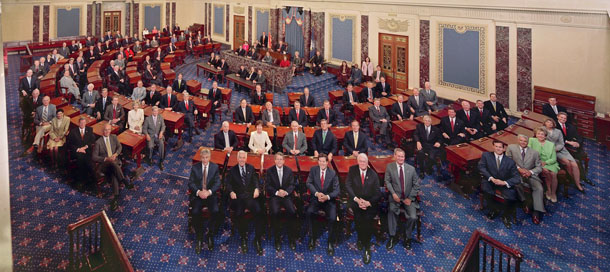The federal government shutdown Friday night after lawmakers failed to reach agreements on funding in time to meet deadlines. A long-term funding bill failed to pass, as did short-term funding bills that were introduced last-minute in order to prevent a shutdown while still leaving time to negotiate key issues.
The shutdown proved brief, however, a compromise was reached on Monday afternoon that will fund the federal government up to Feb. 9 of this year, according to Politico.
One proposed compromise bill, introduced by Republican Senator Rand Paul of Kentucky on Sunday, would have settled funding issues while promising later sessions specifically on immigration. Paul told Politico that the bill failed when Democrats demanded a “must-pass bill” on immigration. “Nobody gets a guaranteed passage,” Paul reportedly replied.
As other lawmakers comment it seems that the issue is not only due to differences between parties, but interference from outside the Senate
Republican Senator Lindsey Graham of South Carolina has said that compromises on immigration drafted by Republican Senators have been prevented from reaching the floor by White House staff members.
“As long as Stephen Miller is in charge of negotiating Immigration, we’re going nowhere,” Graham told reporters Sunday. “The White House staff, I think, is making it very difficult.” Miller, President Trump’s Senior Foreign Policy Advisor and a key voice calling for funding for a wall to be built along the U.S.-Mexico border, has also been criticized by Democratic lawmakers for slowing the negotiating process, according to The Hill.
The agreement to end the shutdown, pitched by Senate Majority Leader Mitch McConnell of Kentucky, is identical to that proposed earlier by Paul suggesting that Democrats gave in to mounting political pressures though some are still skeptical of the Republican lawmakers.
“I realize there’s a trust deficit up here generally,” said Republican Senator John Cornyn of Texas, “but I think one of the first steps to regaining that trust is for [McConnel] to make that commitment and follow through on it.”
While the budget has been funded for the next few weeks, it is likely that another shutdown will occur once it expires on Feb. 9, if McConnell doesn’t keep his word on negotiations in the meantime. This added uncertainty will likely not be good for America’s domestic or global economy, even while preventing the shutdown saves billions of dollars in the meantime.
Despite the common misconception that a government shutdown saves money, a government Shutdown can cost the U.S. economy tens of millions of dollars per day in the form of lost revenue and other forms of income, according to Politico. Much of this revenue comes from sources like national parks, which are among the first government services to stop during a shutdown. Also, while many government workers don’t work or aren’t paid during a shutdown, the workers who fill necessary jobs are almost always paid retroactively once a shutdown ends.
Budget bills are commonly used by lawmakers to bargain over policies that they would like to see implemented, even when those policies have nothing to do with the national budget.
Most of the issues holding up a budget agreement this year include the two parties disagreeing on immigration as Democrats seek protection for illegal immigrants brought into the country as children and Republicans seek stricter border security. This group, often called “dreamers” were given certain protections under the “Deferred Action for Child Arrivals” act, which allowed them to apply for work permits and protected them from immediate deportation. The act was repealed by President Donald Trump earlier this year.
The issue is often compounded by what has been come to be called “chain immigration.” Chain immigration refers to when the family of one of these children is also allowed to stay. Many Republican lawmakers interested in maintaining some of the protections of DACA want to lower the number of family members allowed to stay through chain immigration, or limit family to parents and siblings.
Other issues included funding for the proposed border wall, a cornerstone of President Trump’s platform that now faces a bigger cost than expected as well as the realization that the wall will be paid for by the American people, not Mexico as President Trump insisted.
A similar federal budget stand-off took place in 2013 when the government last shutdown as lawmakers argued over then President Barack Obama’s healthcare reforms. Because Republicans have greater control over the legislative process Democrats are largely being cast as being responsible for the shutdown just as Republicans were in 2013. That shutdown lasted for over two weeks and cost $24 Billion.
President Donald Trump in particular has been quick to place blame on the Democrats , Tweeting, “The Democrats are turning down services and security for citizens in favor of services and security for non-citizens,” and “Great to see how hard the Republicans are fighting for our military and Safety at the Border. The Dems just want illegal immigrants to pour into our nation unchecked [sic],” while the government was shut down over the weekend. Following the shutdown President Trump called the agreement a “big win for Republicans as Democrats cave,” also over Twitter. He also expressed optimism going into further negotiations on DACA, the border, and military budgets.


